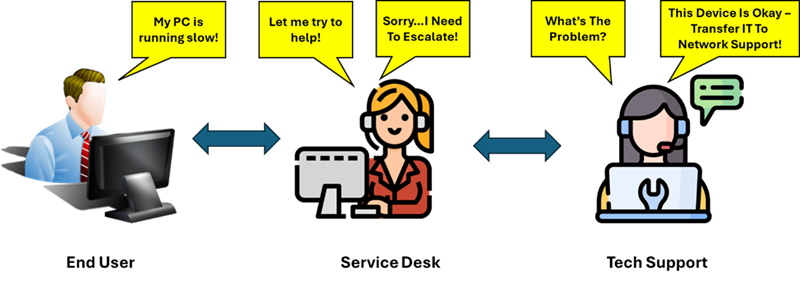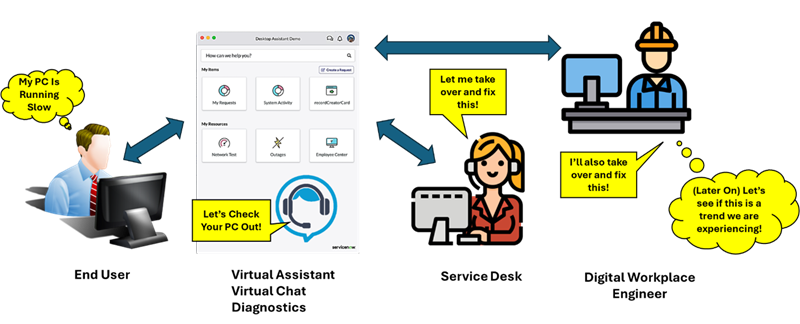The traditional model for Service Desk is undergoing changes to keep up with today’s digital world. Users who traditionally worked using a single desktop device are increasingly using multiple devices to accomplish their tasks. They access their applications and services from a variety of devices and locations. The need to work from anywhere and on any device is quickly growing.
Digital Employee Experience (DEX) is a growing support approach with processes and tools targeted at supporting users in a comprehensive manner across all of their digital workplace. A key change with this approach is in pushing left on the traditional support model. With this, support starts with the user directly first and then proceeds to the Service Desk and higher levels of support only if resolution cannot be accomplished. The focus for the Service Desk and Level 2 (or beyond) emphasizes continual service improvement to continually reduce calls and proactively address service issues versus just reacting to fix incidents and problems.
An illustration of the changes DEX brings about can be shown as follows:
Traditional Support Model

With the traditional approach, the User encounters an issue that requires help. They contact the Service Desk who asks the user many questions to find answers. The Service Desk will then escalate to a higher level of support who assist in resolving the issue. The overall model tends to be siloed in terms of expertise and reactive to addressing user problems and issues.
DEX Support Model

With this approach, the support model might look like this:
- The user encounters an issue that requires help.
- A virtual assistant pops up on the user’s device that provides virtual chat expertise and diagnostics.
- The user interacts with the assistant to see what issues may be happening with the device and what actions can be taken to resolve the issue.
- If not resolved, the virtual assistant initiates contact with the Service Desk for additional assistance. If necessary, the Service Desk agent can take control over the user’s device to take further actions to resolve the issue.
- If still not resolved, the Service Desk agent escalates to a Digital Workplace Engineer. This is a new role that provides comprehensive expertise across many devices, networks and applications with the goal of minimizing extra contacts with other support staff. The Engineer works with both the Service Desk agent and user to together to resolve the issue. The Engineer also has access to view and control the user’s device if needed.
In the background, outside of directly supporting users, the Service Desk organization and Digital Workplace organization work together to proactively look at issues, trends and the overall user experience with their workplace devices and applications. They operate under a program of Continual Service Improvement to address root causes for support contacts. They also measure employee sentiment toward company-provided technology to understand the value that the technology brings. Identified improvement actions are implemented as projects such that over time, higher levels of reliability and value are delivered to the business organization.
DEX Impact On IT Support
When moving toward a DEX strategy, consider the following actions that will need to be in place:
- Establishment of a Continual Service Improvement program (you can use the ITIL-based approach) and practices within the Service Desk and Tier 2 support functions.
- Implementation of a virtual assistant application that runs on user devices. This should have the ability to view device operating and performance statistics as well as allow for Service Desk and Tier 2 takeover of the user’s device if needed.
- Chat function within the virtual assistant application with conversational AI and learning features to help the user find their own solutions to their issues.
- Establishment of a new support role: Digital Workplace Engineer with skills and capabilities to work across different devices and provide strategies for creating positive digital employee experiences.
- Organizational Change Management (OCM) initiative to help transition the support organization to DEX solutions being implemented, DEX benefits, as well as the cultural shift left to empower users to resolve more of their issues independently.
- Training and support initiatives to help boost end user capabilities to better resolve their issues and leverage DEX capabilities.